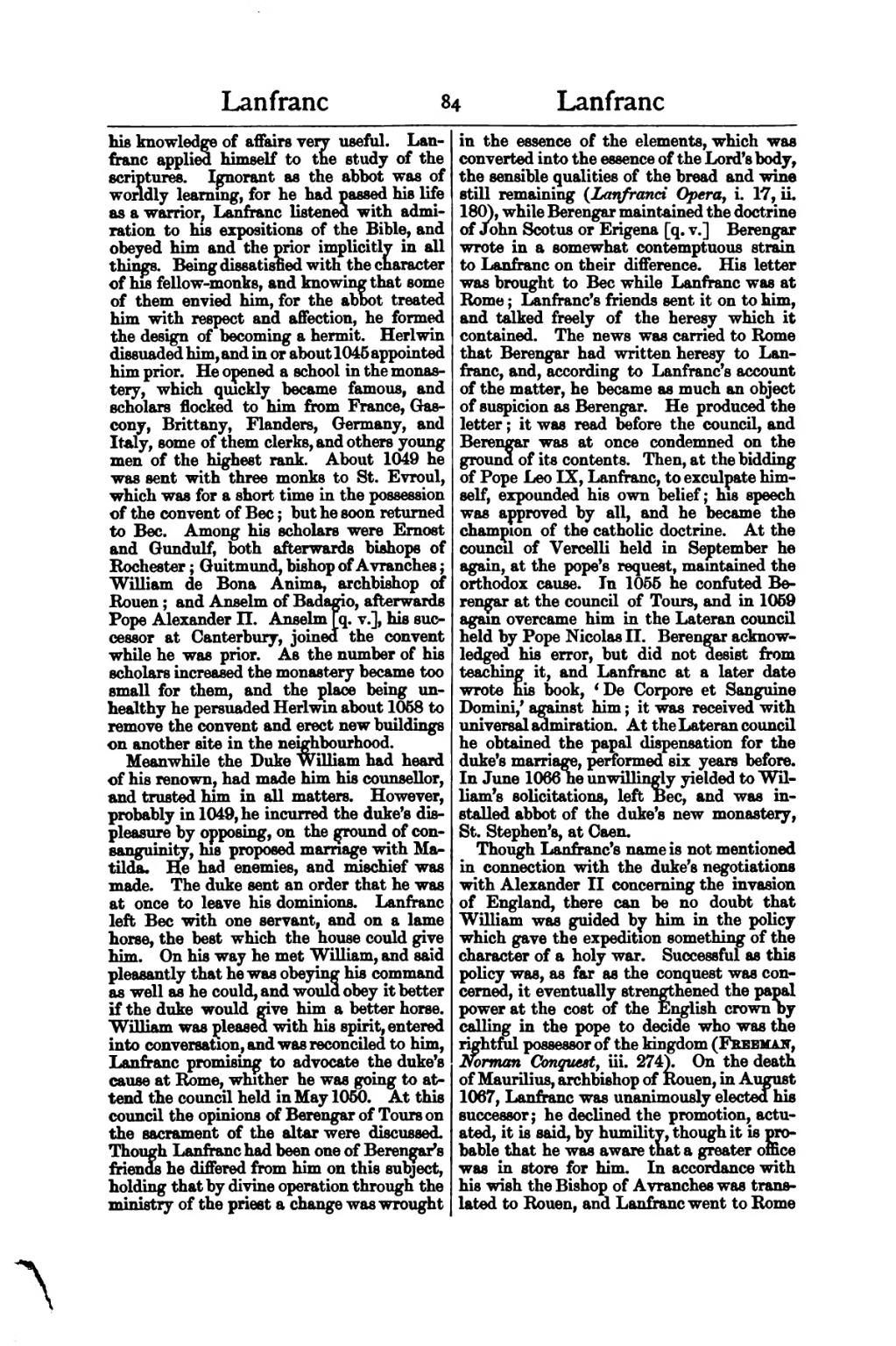his knowled of affairs very useful. Lanfranc applied himself to the study of the Ignorant as the abbot was of wordly learning, for he had passed his life as a warrior, Lanfranc listen with admiration to his expositions of the Bible, and obeyed him and the prior implicitly in all things. Being dissatisfied with the character of his fellow-monks, and knowing of that some of them envied him, for the abbot treated him with respect and affection, he formed the design of becoming a hermit. Herlwin dissuaded him, and in or about 1045 appointed him prior. He opened a school in the monastery, which quickly became famous, and scholars flocked to him from France, Gascony, Brittany, Flanders, Germany, and Italy, some of them clerks, and others young men of the highest rank. About 1049 he was sent with three monks to St. Evroul, which was for a short time in the possession of the convent of Bec; but he soon returned to Bec. Among his scholars was Ernest and Gundulf both afterwards bishops of Rochester ; Guitmund, bishop of Avranches; William de Bona Anima, archbishop of Rouen ; and Anselm of Badagio, afterwards Pope Alexander II. Anselm [q.v.], his successor at Canterbury, joined the convent while he was prior. As the number of his scholars increased the monastery became too small for them, and the place beings unhealthy he persuaded Herlwin about 1058 to remove the convent and erect new buildings on another site in the neighborhood.
Meanwhile the Duke William had heard of his renown, had made him his counsellor, and trusted him in all matters. However, probably in l040, he incurred the duke's displeasure by opposing, on the ground of consanguinity his proposed marriage with Matilda. He had enemies, and mischief was made. The duke sent an order that he was at once to leave his dominions. Lanfranc left Bec with one servant, and on a lame horse, the best which the house could give him. On his way he met William, and said pleasantly that he was obeying his command as well as he could, and would obey it better if the duke would give him a better horse. William was pleased with his spirit, entered into conversation, and was reconciled to him, Lanfranc promising to advocate the duke’s cause at Rome, whither he was going to attend the council held in May 1060. At this council the opinions of Berengar of Tours on the sacrament of the altar was discussed. Though Lanfranc had been one of Berengar's friend he differed from him on this subject, holding that by divine operation through the ministry of the priest a change was wrought in the essence of the elements, which was convened into the essence of the Lord’s body, the sensible qualities of the bread and wine still remaining (Lanfranci Opera, i. 17, ii. 180), while Berengar maintained the doctrine of John Scotus or Erigena [q. v.] Berengar wrote in a somewhat contemptuous strain to Lanfranc on their difference. His letter was brought to Bec while Lanfranc was at Rome; Lanfranc's friends sent it on to him, and talked freely of the heresy which it contained. The news was carried to Rome that Berengar had written heresy to Lanfranc, and, according to Lanfranc‘s account of the matter, he became as much an object of suspicion as Berengar. He produced the letter; it was read before the council, and Berengar was at once condemned on the grounds of its contents. Then, at the bidding of Pope Leo IX, Lanfranc, to exculpate himself, expounded his own belief ; his speech was approved by all, and he became the champion of the catholic doctrine. At the council of Vercelli held in September he again, at the pope's request, maintained the orthodox cause. In 1055 he confuted Berengar at the council of Tours, and in 1059 again overcame him in the Lateran council held by Pope Nicolas II. Berengar acknowledged his error, but did not desist from teaching it, and Lanfranc at a later date wrote is book, ‘De Corpore et Sanguine Domini,’ against him; it was received with universal admiration. At the Lateran council he obtained the papal dispensation for the duke's marriage, performed six years before. In June 1066; he unwillingly yielded to William’s solicitations, left Bec, and was installed abbot of the duke’s new monastery, St. Stephen's, at Caen.
Though Lanfranc’s name is not mentioned in connection with the duke’s negotiations with Alexander II concerning the invasion of Englsnd, there can be no doubt that William was guided by him in the policy which gave the expedition something of the character of a holy war. Successful as this policy was, as far as the conquest was concerned, it eventually strenghened the papal power at the cost of the English crown by calling in the pope to decide who was the rightful possessor of the kingdom (Freeman, Norman Conquest, iii. 274). On the death of Maurilius archbishop of Rouen, in August 1067, Lanfranc was unanimously elected his successor; he declined the promotion, actuated, it is said, by humility, though it is probable that he was aware that a greater office was in store for him. In accordance with his wish the Bishop of Avranches was translated to Rouen, and Lanfranc went to Rome
